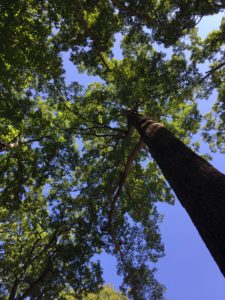Margaret participated in a “Panel on Ecumenical Practices for the Environment” (January 8, 2021), sponsored by the Department of Inter-Orthodox, Ecumenical and Interfaith Relations of the Greek Orthodox Archdiocese of America, along with Shantha Ready Alonso, Rev. Jim Antal, and Rev. Dr. Leah Schade, moderated by Spyridoula Fotinis of the Greek Orthodox Archdiocese of America.
Author Archives: mbj
A NEW BOOK! Margaret contributed a sermon to the new anthology, A Stranger and You Welcomed Me: Homilies and Reflections for Cycle B, ed. Jim Knipper. Other contributors include Nadia Boltz-Weber, Brian McLaren, Richard Rohr, and Mark Bozzuti-Jones. All proceeds from book sales go to groups that help immigrants, refugees, and those who are undocumented.
“I Put My Trust in You,” a sermon for the Fourth Sunday in Advent, delivered for the Episcopal Diocese of Western Massachusetts (December 20, 2020). You can read the sermon text.
I put my trust in you
“Then Mary said, ‘Here am I, the servant of the Lord; let it be with me according to your word.’” (Luke 1:38)Friends, I want to tell an Advent story1 that took place fifteen years ago. In 2005, two massive hurricanes, strengthened by the unusually warm waters of the Gulf, slammed into Louisiana and Mississippi. Millions of Americans were forced from their homes; within hours, most of one city lay in ruins. Soon after Katrina, some members of the wonderful church I served, Grace Church in Amherst, began organizing a service trip to Mississippi. I was planning to go, but then I received an invitation to join a delegation of interfaith religious leaders at the upcoming United Nations’ climate change conference in Montreal.
The trips overlapped, and I couldn’t take both. I decided to head to Montreal, since I wanted to urge world leaders to address global warming before it was too late. So, for several days in Advent I met with representatives of the World Council of Churches; I listened to speeches, wrote editorials, and marched with seven thousand people through the city streets. It was the most vigorous celebration of Advent I’d ever experienced, for the signs and banners sounded the urgent themes of the season: Now is the time to wake from sleep. Now is the time to clean up our act, to sort out our lives, to cast away the works of darkness and put on the armor of light. That exuberant march was one of the gifts I received that Advent, a glimpse of the growing worldwide movement that draws upon humanity’s deepest reserves of hope. The other gift came as a surprise, when I was alone in my hotel. By then I was steeped in the stark reality of climate change. I had studied the aerial photographs of Mount Kilimanjaro without snow; listened to climate reports from the Arctic to Argentina; heard survivors of Katrina describe the vulnerability of the poor. As for my government, it seemed unable to take the issue seriously. After a restless night, I woke up gasping with sorrow and anger, needing badly to pray. I pulled a chair to the window and let my anguish spill out before God – grief for what is irreparably lost, rage at the inertia that kills with such abandon. I felt helpless. Dear Lord, what can I do? What can anyone do? Then I heard something. I put my trust in you.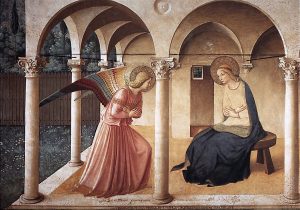
- For a longer version of this story, see Margaret Bullitt-Jonas, Joy of Heaven, to Earth Come Down: Meditations for Advent and Christmas (Cincinnati, OH: Forward Movement, 2012, 2013), 54-60.
Invited to love’s banquet
Jesus’ parable of the wedding feast has been interpreted in all sorts of ways, some of them helpful – some, not so much. Over the years, commentators have interpreted the parable as an angry rebuke of the religious authorities who rejected Jesus; as an allegory to justify the destruction of Jerusalem by Roman soldiers in the year 70 C.E.; and as an account of why early Christian communities opened their doors to Gentiles as well as Jews. At their worst, interpretations of the parable smack of conscious or unconscious anti-Semitism; at their best – well, let’s give it a shot. What meaning can this parable have for us today? In particular, can it give us any spiritual guidance in these turbulent times?
Let’s take it from the top. Once upon a time there was a king – a wise, all-powerful king who decided to hold a wedding banquet for his son. He got everything ready and prepared a feast of the finest foods. He sent out invitations to his chosen guests, saying “Everything is ready; come to the wedding banquet” (Matthew 22:4). But the guests refused to come. Twice they were asked, and twice they turned him down. They “made light” of the invitation, the story tells us, and some “went away, one to his farm, another to his business” (Matthew 22:5), while the rest attacked and killed the messengers.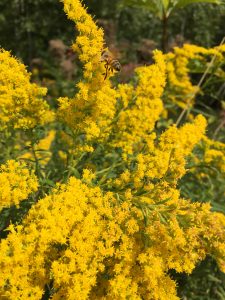
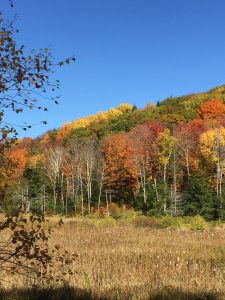
“Praying With Our Bodies”: A brief meditation (videotaped for American Climate Leadership Summit 2020, hosted by ecoAmerica) to ground us in love. Videography and background shakuhachi music by Robert A. Jonas. Filmed in Ashfield, MA.
Faith for the Earth: What will sustain us in the struggles ahead?
I’m imagining that many of you recognize this passage from the Song of Solomon, which is often read at weddings. The Song of Solomon – also known as the “Song of Songs” – is a collection of sensual poems between two lovers who delight in each other and who long to consummate their desire. It turns out that Christian mystics wrote about the Song of Songs more extensively than about any other book in the Bible, interpreting these poems as a passionate conversation between God and the soul.
I’m drawn to this passage today because it’s tough to pay attention to what’s happening to Mother Earth and our fellow creatures, to our oceans, forests, and waterways, to the very air we breathe. As a species we are hurtling willy-nilly down a suicidal path that is bringing down human communities and the very web of life as it has evolved for millennia. What will sustain us in the struggles ahead? I hear an answer in these words: “Arise, my love… and come away.” In a challenging time, it is empowering to remember that God is a lover who is always reaching out to us, always speaking in our depths, always luring us to stay in relationship with each other, with Earth, and with God. For here is God, reaching out a hand to pull us into the dance of life. That’s one way that Christians understand the Holy Trinity: as a dance of love between the lover, the beloved, and the love that flows between (Augustine). “Come on in,” says God, “and join the dance!” “Arise, my love,” God says to our soul. “Arise and come away.” The inner voice of love is quiet. We hardly hear it amid the roar and bustle of the world. We hardly sense it when we’re gripped by worry, depression, or alarm. That’s why many of us reclaim a practice of prayer: we know we will hear the inner voice of love only if we practice stillness, only if we regularly set aside some time in solitude to steady our minds and to listen in silence for the love of God that is always singing in our hearts. As our minds grow quiet and as our stillness grows, a holy Someone – capital S – beckons to us in the silence: “Arise, my love… and come away.” It’s the voice of Jesus, the voice of Spirit, the voice of God. “Arise, my love.” From what do you need to arise? Maybe the Spirit is saying: Arise from apathy, numbness, and fear. Arise from the agitation that holds you in its grip. Arise from hopelessness, for I will give you strength. Arise from loneliness, for I am with you, and I love you. You are my love, says the Spirit. I see your beauty, your intelligence, courage, and resolve, and you are precious in my sight. Arise and come away – away from the cult of death, away from the path of destruction, away from the lie that your efforts to protect life are useless. Come with me and join in the dance of life. Come be a sacred warrior, a warrior for the common good. I will help you find your place in the great struggle to protect life and to build a more just society. “But,” we may protest, feeling helpless before the horrors of the world, helpless before its injustice and needless suffering. “Who am I? I have no power.” Arise. “What can I do? What can any of us do? It is too late to make a difference!” Arise. “I don’t have time. I don’t have energy. I’ve got other things to deal with.” Arise.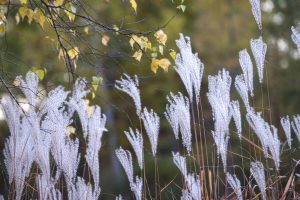 The voice of love is like that, right? It may be soft and hard to hear in a noisy world, but it is persistent. It may be subtle, but it never goes away. The love that created the universe, the love that stirs in our depths, the love that is awakening our hearts – that holy love sends us out into the world to become beacons of light, warriors for truth, and protectors of life. I may have a thousand and one reasons to dodge love’s call, but then it comes again, that voice:
Arise. I love you. I need you. I am calling from the trees, from the wind, from the very stones beneath your feet. I am calling from the orcas and the salmon, from the black bear and the mountains, from the fig trees and the vines. I am calling from the strangers who are not really strangers, but brothers and sisters, siblings you don’t yet recognize, those who are suffering right now from a wounded Earth and a changing climate. I am calling from the future, from the men, women and children who will inhabit this planet long after you are gone and who depend on you to leave them a habitable world. Arise, my love, and join the effort to save our precious planet. Arise!
When we stand in the holy presence of God, we are given fresh strength to renew the face of the Earth. And we arise, joining with indigenous leaders to protect the water and the land, joining with activists to stop new pipelines, joining with city-dwellers to renew crumbling communities beset by poverty and racism, joining with young and old to plant new forests. We cast our lot with people of faith and spirit who have been awakened – as we have been awakened – by a fierce longing to join the dance of life.
What does it look like when we join God’s dance of life? Maybe we cut back strongly on our use of fossil fuels. Maybe we eat local, eat organic, and move to a plant-based diet – for eating less meat turns out to be one of the most climate-friendly things we can do. Maybe we start a compost pile, visit a farmer’s market, support our local land trust, or have a friendly, socially distanced chat with a neighbor we’ve never met before. We need to build up our local communities and to live in ways that are closer to the earth, more life enhancing, more about sharing than consuming, more about self-restraint than self-aggrandizement, more about generosity than fearful survivalism, so that we can take care of each other when the hard times come. There are some very useful Websites that show us how to cut back on our use of fossil fuels, such as LivingTheChange.net and WeRenew.net.
The voice of love is like that, right? It may be soft and hard to hear in a noisy world, but it is persistent. It may be subtle, but it never goes away. The love that created the universe, the love that stirs in our depths, the love that is awakening our hearts – that holy love sends us out into the world to become beacons of light, warriors for truth, and protectors of life. I may have a thousand and one reasons to dodge love’s call, but then it comes again, that voice:
Arise. I love you. I need you. I am calling from the trees, from the wind, from the very stones beneath your feet. I am calling from the orcas and the salmon, from the black bear and the mountains, from the fig trees and the vines. I am calling from the strangers who are not really strangers, but brothers and sisters, siblings you don’t yet recognize, those who are suffering right now from a wounded Earth and a changing climate. I am calling from the future, from the men, women and children who will inhabit this planet long after you are gone and who depend on you to leave them a habitable world. Arise, my love, and join the effort to save our precious planet. Arise!
When we stand in the holy presence of God, we are given fresh strength to renew the face of the Earth. And we arise, joining with indigenous leaders to protect the water and the land, joining with activists to stop new pipelines, joining with city-dwellers to renew crumbling communities beset by poverty and racism, joining with young and old to plant new forests. We cast our lot with people of faith and spirit who have been awakened – as we have been awakened – by a fierce longing to join the dance of life.
What does it look like when we join God’s dance of life? Maybe we cut back strongly on our use of fossil fuels. Maybe we eat local, eat organic, and move to a plant-based diet – for eating less meat turns out to be one of the most climate-friendly things we can do. Maybe we start a compost pile, visit a farmer’s market, support our local land trust, or have a friendly, socially distanced chat with a neighbor we’ve never met before. We need to build up our local communities and to live in ways that are closer to the earth, more life enhancing, more about sharing than consuming, more about self-restraint than self-aggrandizement, more about generosity than fearful survivalism, so that we can take care of each other when the hard times come. There are some very useful Websites that show us how to cut back on our use of fossil fuels, such as LivingTheChange.net and WeRenew.net.
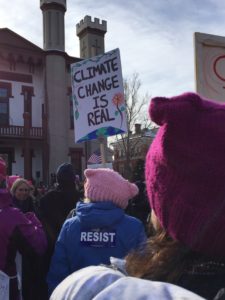 Individual changes are important, but because of the scope and speed of the climate crisis, we need more than individual action – we need systemic change, too. So, we’ll need to use our voices and our votes, and make it politically possible to do what is scientifically necessary. We can support the growing movement to hold Big Polluters like Exxon and Koch Industries financially and legally liable for the damages they knowingly caused (and continue to cause). We can lobby for policies that support renewable energy, clean green jobs, and a just transition that addresses the needs of poor and low-wealth communities and communities of color. If we have financial investments, we can divest from fossil fuels. If we’re college graduates, we can push our alma mater to divest. If our religious institutions haven’t yet divested from fossil fuels, we can urge them to do so – just last week the Vatican urged all Catholics to divest from fossil fuels. Maybe we can join the growing numbers of resolute and faith-filled people who carry out peaceful civil disobedience and put our bodies on the line. Together we need to grow the boldest, most visionary, inclusive, powerful, hope-filled, hands-on, feet-on-the-ground, shoulder-to-the-wheel political and social movement that humanity has ever seen.
What will sustain us in the struggles ahead? The love of God, the power of community, and the resolve to join together to heal and serve and reconcile. In whatever ways we step out to join the dance of life, we will take risks we never imagined we would take. We will connect with people we never imagined we would meet. And we will make more of a difference than we will ever know.
I give thanks for the ways that the Spirit is speaking in our hearts right now and for the ways that you are already responding to its call: “Arise, my love… and come away.”
Individual changes are important, but because of the scope and speed of the climate crisis, we need more than individual action – we need systemic change, too. So, we’ll need to use our voices and our votes, and make it politically possible to do what is scientifically necessary. We can support the growing movement to hold Big Polluters like Exxon and Koch Industries financially and legally liable for the damages they knowingly caused (and continue to cause). We can lobby for policies that support renewable energy, clean green jobs, and a just transition that addresses the needs of poor and low-wealth communities and communities of color. If we have financial investments, we can divest from fossil fuels. If we’re college graduates, we can push our alma mater to divest. If our religious institutions haven’t yet divested from fossil fuels, we can urge them to do so – just last week the Vatican urged all Catholics to divest from fossil fuels. Maybe we can join the growing numbers of resolute and faith-filled people who carry out peaceful civil disobedience and put our bodies on the line. Together we need to grow the boldest, most visionary, inclusive, powerful, hope-filled, hands-on, feet-on-the-ground, shoulder-to-the-wheel political and social movement that humanity has ever seen.
What will sustain us in the struggles ahead? The love of God, the power of community, and the resolve to join together to heal and serve and reconcile. In whatever ways we step out to join the dance of life, we will take risks we never imagined we would take. We will connect with people we never imagined we would meet. And we will make more of a difference than we will ever know.
I give thanks for the ways that the Spirit is speaking in our hearts right now and for the ways that you are already responding to its call: “Arise, my love… and come away.” Faith for the Earth: What are we longing for?
What do you long for most?
What is most precious to you? What do you want more than anything else? To some Christians these may be surprising questions, since many of us associate our faith with self-denial rather than desire. But when two disciples of John the Baptist are curious about Jesus and start to follow him, Jesus doesn’t turn around and deliver a lecture or a teaching; he doesn’t give advice or moral counsel. Instead, he asks a question – an essential and revealing question: What are you looking for? What do you seek? What do you really want? This is a piercing question, especially for all of us who live in an addictive society that is quick to tell us what we want. You’ve probably noticed that if we don’t know what we truly want, our desires are likely to get hijacked by what the culture around us tells us to want. I remember driving one day and seeing an advertisement on the back of a truck up ahead. I could just make out the headline, which declared in big letters, “What you are looking for.” I took the bait. I said to myself: Alright, what do you think I’m looking for? I drove a little faster and pulled up behind the truck, and there it was: a picture of a woman lounging comfortably with a cigarette between her lips. A cigarette was what I must be looking for. And, if not a cigarette, how about a car or the latest gadget or the newest fashion or the up-to-the-minute app? Whatever you’re looking for, we’ve got it. We’ll sell it to you.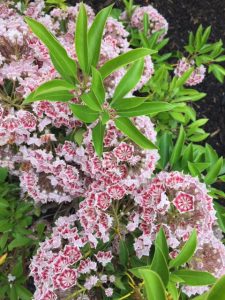 The purpose of advertising is not just to sell a particular product but to create a climate of craving, so that we devote our best energies to buying and selling, to the endless process of acquiring, discarding, updating, and accumulating. Of course, there are material things that we need to survive and thrive, but we live in a throwaway culture that is based on the perpetual expansion of markets, the boundless consumption of resources, and the relentless burning of fossil fuels. No wonder Earth is groaning beneath the burden of human wants – while human need grows exponentially.
What are we longing for? What do we seek? What do we really want? These questions require honest self-examination. You could say that they come with a shovel, because when we’re fired up by questions like these, we carry out an archaeology of our motives and desires and dig down deep to discover the bedrock of what we truly want. What truly will make us happy? What truly will fulfill our restless cravings and set our hearts at rest? After we have sorted through our lesser wants, what we may discover is that deep down what we want is to be fully alive. Deep down we want to love and to be loved, to know and to be known, and to draw close to the holy Source of love. Deep down we want our lives to be about something much larger than ourselves and our endless, insatiable striving and self-promotion. We want our lives to have a creative purpose and meaning, and we want to be a blessing to other people.
Knowing and claiming our heart’s desire is like having a compass in our pocket. It is like having the North Star overhead, to guide our way. When we know our heart’s desire, in every moment we have a dependable indicator that helps point the way to wise action and loving speech. Moment to moment, in everything we do, in every situation we encounter, we can ask ourselves: How do I meet this situation in a way that taps my creativity and resonates with my deepest desire and highest purpose? What can I say in this moment, what can I do in this moment that will let that deep intention be more fully expressed? The more completely our lives align with what we value most, the more inner peace and stability we will feel, no matter what our outer circumstances may be. I assure you, when you are lit with creativity, curiosity, compassion and love, you will light up other people’s lives!
As I speak these words, we are hurtling toward a future in which all of us will live on a harsher, hotter, and more turbulent planet than the one into which we were born. As Bill McKibben succinctly puts it, “Our old familiar globe is suddenly melting, drying, acidifying, flooding, and burning in ways that no human has ever seen… We’ve undermined the basic physical stability of this planet.”1 Already we are experiencing massive droughts and floods, extreme storms and wildfires, and millions of people are already on the move, looking for a safer place to raise their families. A warming climate is the perfect breeding ground for the spread of tropical diseases and pandemics. And because climate change is a so-called “threat multiplier,” we can expect an increasing push toward conflict and war as regions and nations struggle over scarce resources.
How do we prepare for adversity? Here’s one answer: We find out what we really value, what we really long for, and what kind of world we want to create. We find our moral compass, our own North Star, and we set our course accordingly. We join hands with other people who want to cast their lot with love and justice and compassion.
One of the people we interviewed for our book, Rooted and Rising, was Rev. Lennox Yearwood, Jr. He’s the President and CEO of Hip Hop Caucus, which is a national, nonprofit, nonpartisan organization that engages young people and communities of color in the political process and that has registered tens of thousands of young voters to the polls. Rev Yearwood is giving his life to the struggle for racial, economic, and environmental justice. Like so many other people, he is dedicated to a possibility that can seem impossibly out of reach.
I asked him where he turns for strength when he feels discouraged or overwhelmed, and here is part of his reply. He said: “You have to believe in something outside yourself. You have to find your anchor. For me, it’s God and Christianity, but you’ve got to find your own anchor. If you don’t, you will be blown away. You can’t do activism without an anchor. You can’t do activism without faith or some form of belief – maybe a belief in the future, or in children. It’s great if you have a faith tradition, because there are pieces there that you can hold on to, such as a sacred text, poetry, music – all kinds of things that can inspire you. But you need to have something.”2
He went on to say, “I’m anchored. I’m anchored in my tradition as a person of color, knowing that the people before me had to fight so hard to overcome slavery, to overcome the injustice of Jim Crow, to overcome acts of voter suppression. I’m in a tradition of waking up with those who have already fought. And then, as a person of faith and a minister, I link to this tradition of faith so that whatever I do, my steps are ordered. I know that God is leading me on the right path of fighting for other people, not just for myself. I’m fighting for God’s children and for God’s planet. That allows me to continue and sometimes to do remarkable things with other people….”3
Those are the words of someone who has found his heart’s desire – someone who knows that in this time of multiple emergencies, we need healers and justice-seekers, people who will stand up and cast their lot with life and do justly, now. And love mercy, now. And walk humbly, now.
If God were to whisper in your ear, “This is why I sent you here. This is what I sent you to do,” what would God say next? Find out.
______________________________________________________________________________________________________
1. Bill McKibben, Eaarth: Making a Life on a Tough New Planet (New York: Henry Holt and Company, Times Book, 2010), xiii and book jacket.
2. Lennox Yearwood, Jr., “Interview,” by Margaret Bullitt-Jonas, Rooted and Rising: Voices of Courage in a Time of Climate Crisis (Lanham. MD: Rowman and Littlefield, 2019), 99.
3. Ibid.
The purpose of advertising is not just to sell a particular product but to create a climate of craving, so that we devote our best energies to buying and selling, to the endless process of acquiring, discarding, updating, and accumulating. Of course, there are material things that we need to survive and thrive, but we live in a throwaway culture that is based on the perpetual expansion of markets, the boundless consumption of resources, and the relentless burning of fossil fuels. No wonder Earth is groaning beneath the burden of human wants – while human need grows exponentially.
What are we longing for? What do we seek? What do we really want? These questions require honest self-examination. You could say that they come with a shovel, because when we’re fired up by questions like these, we carry out an archaeology of our motives and desires and dig down deep to discover the bedrock of what we truly want. What truly will make us happy? What truly will fulfill our restless cravings and set our hearts at rest? After we have sorted through our lesser wants, what we may discover is that deep down what we want is to be fully alive. Deep down we want to love and to be loved, to know and to be known, and to draw close to the holy Source of love. Deep down we want our lives to be about something much larger than ourselves and our endless, insatiable striving and self-promotion. We want our lives to have a creative purpose and meaning, and we want to be a blessing to other people.
Knowing and claiming our heart’s desire is like having a compass in our pocket. It is like having the North Star overhead, to guide our way. When we know our heart’s desire, in every moment we have a dependable indicator that helps point the way to wise action and loving speech. Moment to moment, in everything we do, in every situation we encounter, we can ask ourselves: How do I meet this situation in a way that taps my creativity and resonates with my deepest desire and highest purpose? What can I say in this moment, what can I do in this moment that will let that deep intention be more fully expressed? The more completely our lives align with what we value most, the more inner peace and stability we will feel, no matter what our outer circumstances may be. I assure you, when you are lit with creativity, curiosity, compassion and love, you will light up other people’s lives!
As I speak these words, we are hurtling toward a future in which all of us will live on a harsher, hotter, and more turbulent planet than the one into which we were born. As Bill McKibben succinctly puts it, “Our old familiar globe is suddenly melting, drying, acidifying, flooding, and burning in ways that no human has ever seen… We’ve undermined the basic physical stability of this planet.”1 Already we are experiencing massive droughts and floods, extreme storms and wildfires, and millions of people are already on the move, looking for a safer place to raise their families. A warming climate is the perfect breeding ground for the spread of tropical diseases and pandemics. And because climate change is a so-called “threat multiplier,” we can expect an increasing push toward conflict and war as regions and nations struggle over scarce resources.
How do we prepare for adversity? Here’s one answer: We find out what we really value, what we really long for, and what kind of world we want to create. We find our moral compass, our own North Star, and we set our course accordingly. We join hands with other people who want to cast their lot with love and justice and compassion.
One of the people we interviewed for our book, Rooted and Rising, was Rev. Lennox Yearwood, Jr. He’s the President and CEO of Hip Hop Caucus, which is a national, nonprofit, nonpartisan organization that engages young people and communities of color in the political process and that has registered tens of thousands of young voters to the polls. Rev Yearwood is giving his life to the struggle for racial, economic, and environmental justice. Like so many other people, he is dedicated to a possibility that can seem impossibly out of reach.
I asked him where he turns for strength when he feels discouraged or overwhelmed, and here is part of his reply. He said: “You have to believe in something outside yourself. You have to find your anchor. For me, it’s God and Christianity, but you’ve got to find your own anchor. If you don’t, you will be blown away. You can’t do activism without an anchor. You can’t do activism without faith or some form of belief – maybe a belief in the future, or in children. It’s great if you have a faith tradition, because there are pieces there that you can hold on to, such as a sacred text, poetry, music – all kinds of things that can inspire you. But you need to have something.”2
He went on to say, “I’m anchored. I’m anchored in my tradition as a person of color, knowing that the people before me had to fight so hard to overcome slavery, to overcome the injustice of Jim Crow, to overcome acts of voter suppression. I’m in a tradition of waking up with those who have already fought. And then, as a person of faith and a minister, I link to this tradition of faith so that whatever I do, my steps are ordered. I know that God is leading me on the right path of fighting for other people, not just for myself. I’m fighting for God’s children and for God’s planet. That allows me to continue and sometimes to do remarkable things with other people….”3
Those are the words of someone who has found his heart’s desire – someone who knows that in this time of multiple emergencies, we need healers and justice-seekers, people who will stand up and cast their lot with life and do justly, now. And love mercy, now. And walk humbly, now.
If God were to whisper in your ear, “This is why I sent you here. This is what I sent you to do,” what would God say next? Find out.
______________________________________________________________________________________________________
1. Bill McKibben, Eaarth: Making a Life on a Tough New Planet (New York: Henry Holt and Company, Times Book, 2010), xiii and book jacket.
2. Lennox Yearwood, Jr., “Interview,” by Margaret Bullitt-Jonas, Rooted and Rising: Voices of Courage in a Time of Climate Crisis (Lanham. MD: Rowman and Littlefield, 2019), 99.
3. Ibid.
Faith for the Earth: Who do we think we are?
In a time that is so precarious and uncertain, I think it’s worthwhile to go back to basics and to claim the deep wisdom of our different faith traditions. Who do we think we are? That’s the question I’d like to reflect on this morning. Every religious tradition has its own ways of answering that question, its own ceremonies and celebrations to help its members remember what it means to be a human being. For Christians, the ceremony of baptism has a crucial role to play in revealing our human identity and vocation.
The passage we just heard is one of the essential, not-to-be-missed stories of Christian faith, a story that is told or referred to in all four Gospels, and it’s the very first story about Jesus in the very earliest Gospel, the Gospel of Mark. Jesus’ baptism in the River Jordan was clearly a decisive experience, a pivotal event that revealed who he was and launched his public ministry. When Jesus was baptized, he accepted the identity that had been his since before time began: He was, and had always been, the child of God, the beloved of God, and nothing and no one could take that love away. Following Jesus, Christians of every denomination consider baptism a basic practice of our tradition, although not all of us take a plunge into a river or another body of water – many of us get only a small splash at a font inside a church. Still, however the ceremony is carried out, we believe that what happened to Jesus in his baptism can happen to us in ours, if we desire to be awakened to the divine within. From that moment and for the rest of our lives, we are drawn into the life of God, caught up in an unbreakable, unshakable relationship of love. Do you ever wonder who you are, who you really are, deep down? Today’s Gospel story gives the answer. Without doing a thing to earn it or deserve it, you are the son, you are the daughter, you are the beloved of God – you are the one with whom God is well pleased. Of course, every day we can have doubts about ourselves and wonder whether we’re good enough, smart enough – beautiful, handsome, or successful enough. But we have a deeper identity that we can claim. Those who follow the Abrahamic traditions believe that we are created in the image and likeness of God, which means that deep within our everyday self, we have an eternal Self that is always embraced by our loving God. Wherever you go, whatever you do, wherever the Spirit sends you, the divine life is flowing through you, as close as your breath, as close as your heartbeat. You and I belong to the eternal Divine forever, and love is our essential nature. I don’t know about you, but I find it deeply consoling to hold on to this truth right now, when so many of us feel stressed, scattered, anxious or depressed. We live in a turbulent time, and the world is rapidly changing. Sometimes it seems that everything is falling apart, and it’s easy to feel unmoored, ungrounded, and afraid. What a perfect moment to remind ourselves of our eternal Self (capital S) and to touch in again to the deep truth that we are God’s beloved daughter or son, and that at this very moment nothing can separate us from the love of God (Roman 8:35-39). Here’s the thing: the love that is awakened within us through baptism or other rituals, the love that flows through us with our every breath – that love extends not only to us or to people like us, but also to the whole human family – in fact, it extends to the whole Creation. Scripture tells us so – we see this message and promise in Genesis and the psalms, in the Gospel of John and the letters of Paul.1 God’s love is boundless and sustains all things. We don’t have to be mystics to “get” this, for we glimpse that truth in our own experience. Anyone who has ever been amazed by the beauty of the world – anyone who has ever spent time studying the details of a single leaf, or gazing at a mountain, or looking at the stars at night knows what it’s like to feel a wave of wonder, humility, gratefulness and awe. We meet God when we open our eyes and hearts to the natural world. When we spend time outside, God invites us to slow down, look carefully, and greet our other-than-human kin. We belong to each other; we were created by the same divine Source of love. I think that Jesus knew this, for he lived close to the Earth, and in the Gospel stories we often find him outdoors, praying in the desert, walking along a seashore, or climbing a mountain. In today’s story, he’s immersed in a river! Jesus’ parables and stories are full of nature, full of seeds and sheep, lilies and sparrows, vines and rocks, storms and sunsets. It seems to me that Jesus recognized the inherent sacredness of the created world. He knew that we belong to a living, sacred whole and that everything is lit up with God. Jesus knew what the psalms proclaim – the Earth is the Lord’s, and everything in it (Psalm 24). He knew what poet Gerard Manley Hopkins proclaims: “The world is charged with the grandeur of God.”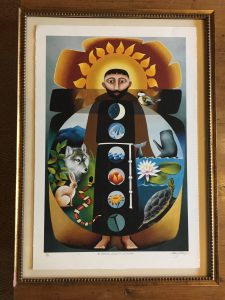
Faith for the Earth: What is breaking our hearts?
We spoke yesterday about God inviting us to listen deeply, especially to voices that have long been silenced or ignored – to the voices of the poor, the voices of black and brown and indigenous peoples, and to the voices rising from the living Earth itself – for if we listen with the ear of the heart, surely we can hear, as the prophet Hosea puts it in today’s reading, that the land itself is mourning, “and all who live in it languish; together with the wild animals and the birds of the air, even the fish of the sea are perishing.”
How do we pray with all this? How do we pray with the things that are breaking our hearts – the dying coral and acidifying oceans, the animals that are leaving us, and the web of life that is unraveling before our lives? Scientists say that unless we change our way of living fast, entire eco-systems could begin to collapse, starting in the next ten years. What do we do with this information? Do we shrug it off (I can’t deal with that! That’s someone else’s problem!)? Do we shut down inside, go numb and slip into despair? It’s difficult to face the predicament in which we find ourselves, and our culture gives us endless opportunities to turn away and distract ourselves with mindless consumption and entertainment. Still, I don’t think any of us have found that shopping or snacking or swilling alcohol can ease the anguish we feel inside. In my view, one essential remedy is prayer. Bold action is urgent and necessary, but action alone won’t give us the strength or wisdom to sustain the hard struggles ahead. And if Hosea got it right – if what’s ultimately wrong with the world is that there is “no knowledge of God in the land,” if he’s right that the ultimate source of our troubles is spiritual disconnection – then surely part of the remedy is prayer. For, as Hosea says, when there is “no knowledge of God,” then “swearing, lying, and murder” break out among human beings – “bloodshed follows bloodshed” – and the land mourns, and wild creatures languish and perish. Hosea understands that a broken relationship with God leads to a broken relationship with each other and with the Earth. If we abandon the love and justice of God and get locked into patterns of abusing each other and abusing the land, the remedy is repentance and amendment of life. The remedy is to dismantle the systems that exploit people and the planet. The remedy is to restore our connection to God, to our souls, to each other, and to the Earth upon which all life depends.